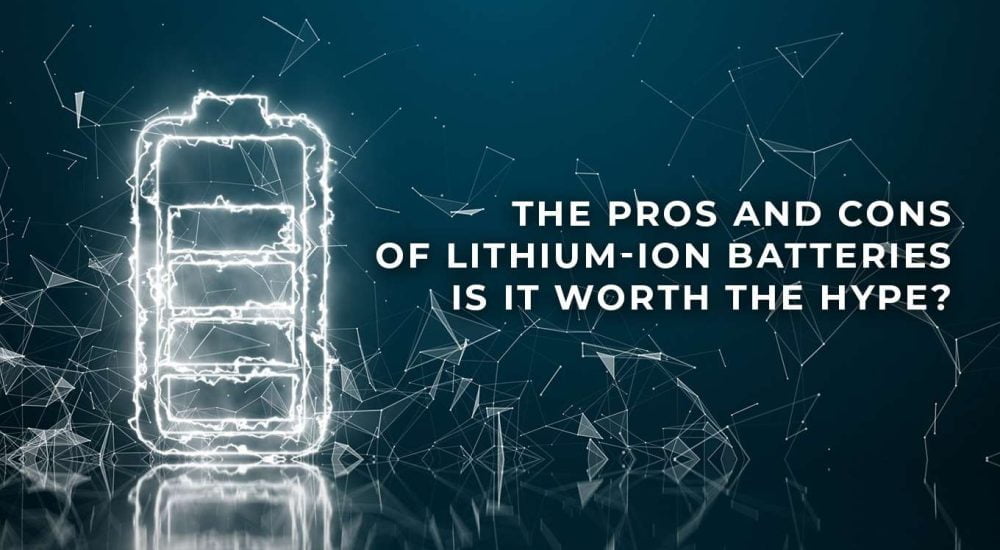
Introduction
Lithium-ion batteries have become a ubiquitous part of our daily lives. Powering everything from smartphones and laptops to electric vehicles and renewable energy systems. Their widespread adoption is largely due to their high energy density, long cycle life, and relatively low self-discharge rate.
However, as with any technology, lithium-ion batteries have their fair share of advantages and disadvantages. In this article, we will explore the pros and cons of lithium-ion batteries to determine if they are truly worth the hype.
Pros of Lithium-Ion Batteries
High Energy Density
One of the primary advantages of lithium-ion batteries is their high energy density. This means they can store a significant amount of energy in a relatively small and lightweight package. This characteristic makes them ideal for portable devices like smartphones and laptops, where space and weight constraints are essential.
Long Cycle Life
Lithium-ion batteries have a longer cycle life compared to other battery technologies. Such as nickel-cadmium or lead-acid batteries. They can withstand hundreds to thousands of charge and discharge cycles before their capacity degrades. This longevity makes them cost-effective in the long run.
Fast Charging
Lithium-ion batteries can be charged quickly, which is a crucial feature for modern consumers. This fast-charging capability is especially vital in electric vehicles, where the ability to recharge rapidly can significantly reduce downtime and improve the overall user experience.
Low Self-Discharge
Lithium-ion batteries have a relatively low self-discharge rate. Which means they can retain their charge over extended periods without substantial energy loss. This feature is advantageous for devices that are not in constant use. Such as emergency backup systems or occasional-use power tools.
Lightweight
Lithium-ion batteries are lightweight, which is essential for portable devices. This characteristic allows manufacturers to design sleek and compact gadgets without compromising on power capacity.
Versatile Applications
Lithium-ion batteries are versatile and can be used in a wide range of applications. They power not only consumer electronics and electric vehicles but also renewable energy storage, medical devices, and aerospace technology, showcasing their adaptability.
Environmental Benefits
Compared to some other battery technologies, lithium-ion batteries have a smaller environmental footprint. They do not contain hazardous materials like lead or cadmium, which can be harmful when disposed of improperly. Furthermore, they enable the use of renewable energy sources. Also, reduce greenhouse gas emissions in electric vehicles. Lithium-ion batteries contribute to environmental sustainability.
Cons of Lithium-Ion Batteries
Cost
One of the most significant drawbacks of lithium-ion batteries is their initial cost. They tend to be more expensive to manufacture than traditional batteries. Primarily due to the materials and manufacturing processes involved in their production. However, as technology advances and economies of scale come into play, their cost is gradually decreasing.
Limited Lifespan
While lithium-ion batteries have a long cycle life, they do have a limited overall lifespan. Over time, the capacity of a lithium-ion battery degrades, and it may no longer meet the energy needs of the application. When this occurs, the battery needs to be replaced, which can be costly and generate electronic waste.
Safety Concerns
Lithium-ion batteries have been associated with safety concerns. Particularly, during instances of thermal runaway or battery fires. The electrolyte in these batteries is flammable, and under certain conditions, such as overcharging or physical damage, it can lead to fires or explosions. Battery management systems and safety features are continually improving to mitigate these risks, but safety remains an important consideration.
Limited Availability of Materials
Lithium-ion batteries rely on certain materials like lithium and cobalt, which are finite resources. The demand for these materials is increasing with the growing use of lithium-ion batteries. Potentially leading to supply chain issues and price fluctuations. Efforts are being made to develop alternative chemicals with more sustainable materials.
Performance in Extreme Temperatures
Lithium-ion batteries do not perform well in extreme temperatures. Cold weather can significantly reduce their capacity and efficiency. While high temperatures can accelerate degradation and pose safety risks. This limitation can be a significant concern for electric vehicle owners in regions with harsh climates.
Slow Capacity Improvement
While lithium-ion battery technology has come a long way. It has been relatively slow in terms of capacity improvement compared to other emerging battery technologies. This slower progress may limit the ability of lithium-ion batteries to meet the increasing energy demands of the future.
Is It Worth the Hype?
Lithium-ion batteries have undoubtedly revolutionized the way we power our devices and have become an integral part of our lives. They offer a host of advantages, including high energy density, long cycle life, fast charging, and versatility. However, they are not without their challenges, such as cost, safety concerns, and limited materials.
The worth of lithium-ion batteries largely depends on the specific application and the context in which they are used. For many consumer electronics, electric vehicles, and renewable energy systems, they are currently the best available options. As technology advances and researchers address their limitations. Lithium-ion batteries are likely to become even more competitive in various fields.
Conclusion
Lithium-ion batteries have earned the hype they’ve received, considering their numerous advantages and contributions to sustainable energy solutions. However, it’s essential to recognize their limitations and actively work to address them, both in terms of safety and sustainability.
While lithium-ion batteries are a crucial part of our present and near future. They may not be the ultimate solution for all energy storage needs. Ongoing research into alternative energy storage technologies is equally important to meet the challenges of tomorrow.
